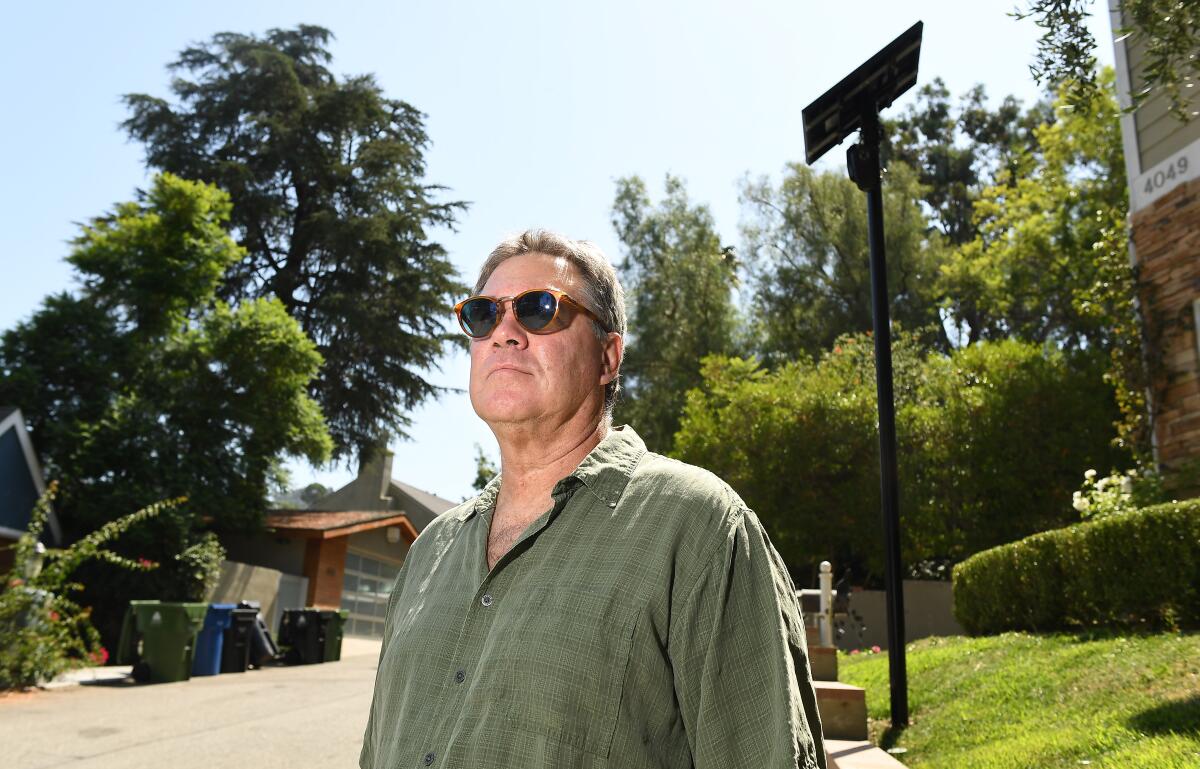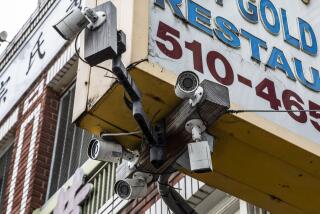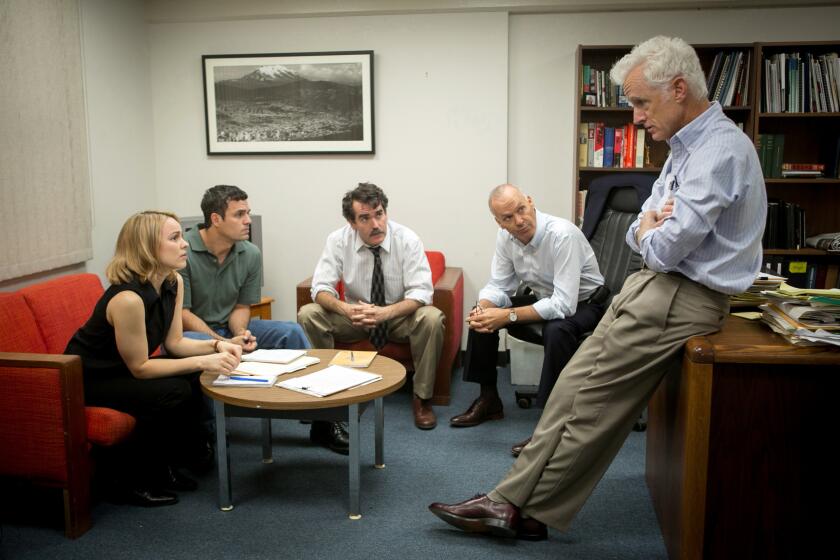Neighbors are using these smart cameras to track strangers’ cars — and yours

On a quiet road south of Ventura Boulevard, two cameras on a pole watch over the road, facing opposite directions.
A block away, another brace of cameras sit sentry. Together, they constantly film the two points of entry to a closed loop of public streets in Sherman Oaks.
Nearby, on a dual-screen setup in the basement of his hillside home, Robert Shontell pulls up hundreds of snippets of footage captured by the cameras earlier that day. Each shows a car, time-stamped and tagged with the make, model, paint color and license plate.
He searches for a silver Honda spotted between the hours of 1 and 2 p.m. After some scrolling, a shot of my car — and me — pops up.
“The most surprising thing is just how many cars drive through the neighborhood each day,” Shontell says. And every one ends up filmed by the motion-activated cameras, then tagged and entered in the database by the machine vision software powering the system.
Residents of the neighborhood had pooled their money to rent these cameras, and the software behind them, from Flock Safety — an Atlanta-based company that has found clients for its automatic license plate readers in safety-conscious communities, homeowners’ associations and local police departments across 30 states.
The company’s pitch: With its cameras, residents can track every vehicle that passes through their neighborhood. If a burglar strikes, they can check and see which cars were spotted in the area around the time of the crime, and pass that footage on to police. To allay privacy concerns, only the residents have access to the footage, and it automatically deletes after 30 days.
Costs vary depending on the client, but Flock generally charges $2,000 per camera per year for the service, and reports that more than 400 communities are using its product. It’s backed by serious Silicon Valley investment: The company was a member of prominent start-up accelerator Y Combinator’s summer class of 2017 and has since raised nearly $20 million in funding from tech heavyweights including Matrix Partners and Peter Thiel’s Founders Fund.
“Our cameras are helping solve two crimes every single day right now,” said Josh Thomas, Flock’s head of marketing. The company said it couldn’t share details of every case but did note that the technology was integral to a recent arrest of a ring of 24 sexual predators in north Georgia, and local media outlets report a steady drumbeat of burglaries and car thefts that Flock helped to solve. “If we can reach further scale and put out more detective-like cameras on every street corner, we can solve more crime.”
Flock’s push to put a camera on every corner comes at a time when smart cameras and social media are combining to create a newly paranoid model of neighborhood life. The message boards on Nextdoor, a social service that requires users to verify their addresses to ensure that only true locals are allowed to post, are rife with reports of suspicious noises, cars and people.
Footage from Ring, a video doorbell company, often ends up on Nextdoor or shared on its in-house social network, Neighbors. Recent reporting from Motherboard has revealed that local police have signed secret agreements to hawk Ring systems to their local communities, and BuzzFeed found that the company is testing out facial recognition technology with its clients in Ukraine.
License plate reader technology, which has been used by the Los Angeles Police Department and agencies across the state for years, has raised concerns among privacy advocates, and the state of California is investigating the legality of its use in law enforcement.
“License plate readers have been recognized by the Legislature and lots of police departments — and certainly civil liberty groups — as technology that can violate people’s privacy by tracking their movements without their consent,” said David Maass, senior investigative researcher with the Electronic Frontier Foundation, a digital civil liberties nonprofit.
The leap from traditional security camera systems to those powered by machine vision, like automatic license plate readers, is as vast as the difference between an analog library and the modern internet. Before, a human would have to pore over hours of footage from multiple cameras to try to piece together a car’s movement through a neighborhood, let alone an entire city. Now, the software can instantly spit out a list of all sightings, effectively creating a shot-by-shot map of a car’s whereabouts.
And while the technology is more accurate than its machine vision cousin, facial recognition software, false positives remain a risk.
Last year in Contra Costa County, a license plate reader spotted a car on the freeway listed as stolen in a state database. Police pulled the car over, approached with guns drawn, handcuffed the driver and his passenger, and forced them to kneel on the pavement at gunpoint, believing them to be dangerous. But the stolen car database was out of date — the car was a rental and had been reported stolen, then recovered, earlier in the year.
Outcry over incidents like this prompted state legislators in 2015 to pass a law regulating how public agencies can use automatic license plate readers, but recent pushback from privacy advocates, backed by research indicating that law enforcement may not be following the law, prompted the state auditor to launch a probe into the technology’s use in June.
Flock’s extension of the same technology into the private sphere raises another set of concerns: Private citizens are unlikely to receive the same training, or be subject to the same oversight, as public employees. A neighborhood administrator could easily search local Flock records to track a spouse’s whereabouts. And while the onus is currently on Flock clients to send their footage to police to assist in an investigation, there’s little stopping police, once they know cameras are in place, from requesting footage from Flock users to track anyone who passes through the area — a practice that’s already common with Ring video.
“Our customers are the ones who own all the footage. We don’t access it, we don’t share it with third parties, we don’t sell it. They can share that with their local law enforcement in the event of the crime if they choose,” said Flock’s Thomas.
“It would be a breach of contract if they were to use it for other nefarious purposes,” he added. “We would end our contract and take it back,” though he noted that with no access to a client’s account, the company has no way to monitor the systems for abuse.
Shontell said that he and his neighbors started looking into the company after a series of break-ins on their street, having heard about it from friends who live in a nearby hillside neighborhood, and decided to install the cameras earlier this summer. As a career film and TV editor, he volunteered to be one of the technical administrators for the system.
During the setup process, users can add a list of residents’ plates, to avoid mistaking a neighbor for an interloper. Those with a direct line to the system administrators can also request that footage of their cars not be logged in the system. Shontell said that the neighborhood group went door to door to let every household know they were installing the cameras, but there’s no legal requirement that they do so.
Flock also records footage of cyclists and pedestrians moving past its cameras. Users can search in those broad categories by time, scrolling through a list of every person who walked or biked by, but the more advanced search criteria only work for cars. The interface also has a “dog” category, which largely consists of clips of people walking their dogs.
The street has been crime-free so far, but Shontell said his neighbors — many of whom have private cameras or Ring systems for their own homes — feel safer with a belt-and-suspenders approach to neighborhood security.
“We can tell who’s coming and going 24/7. Some people might have an issue with that,” Shontell said. “I tend to think personally that what you might give up in terms of privacy is overshadowed by what you gain: possibly having some real evidence to give the police.”







